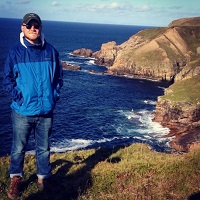Andrew M. Jones '12 is currently working on his doctorate in church history at University of Edinburgh.

What is your life story since graduation?
After Wheaton, I moved to South Hamilton, Massachusetts to begin an MA in Church History at Gordon-Conwell Theological Seminary. My two years outside of Boston were formative, both as an aspiring historian and a follower of Christ. The church I plugged into and the friends that I made encouraged me in my faith in which, for me as well as others, tended to be a season of questioning and struggle following my time at Wheaton. My professors at Gordon-Conwell demanded excellence, while also exhibiting grace. It is to them, as well as Dr. McKenzie, Dr. Harkrider, and others at Wheaton, that I owe much of my current - if limited - success. Upon finishing the MA at Gordon-Conwell, I moved to Edinburgh, Scotland to pursue doctoral studies in nineteenth-century British Religious History at the University of Edinburgh. My thesis (as the British PhD focuses almost exclusively on a dissertation-sized piece of original work) will attempt to assess the continued influence and changing nature of Evangelicalism within the Established Church of Scotland between 1843 and the First World War. I studied abroad during my junior year at Wheaton at the University of St. Andrews, so the culture shock has been less pronounced. I'm also sharing a flat (apartment) with one of my best friends from my time in St. Andrews. Though only two months into the program, I am - yet again - falling in love with Scotland and have made some other wonderful friends through my studies and my church.
Can you tell us a bit about your vocational aspirations?
Lord willing, I plan to apply for teaching positions within History, Theology, and/or Religious Studies faculties upon the completion of my PhD. The job market for historians is tough, and I will be happy to land anywhere. I would, though, love to end up somewhere like Wheaton, Covenant, or Calvin in the long run.
How well did your history major prepare you for graduate school?
Wheaton's History faculty prepared me well for graduate school. The focus on academic writing and the inclusion of two methodology courses during the degree helped me make a seamless transition.
Outside of your graduate training, are there ways that your history major has enriched your life?
How has my history education enriched my life beyond my current studies and career goals? The list is long. For one, learning to think analytically and assess documents, figures, events, and movements within their contexts has created a lifelong habit of trying to think critically and argue with nuance in a culture that loves to jump to conclusions. More importantly, the teleological and epistemological foundations of my own view of history - laid in dialogue with Dr. McKenzie and others - have personal worldview implications that transcend the historical.
What advice would you provide to current or future history majors about making the most of their studies and degree?
First, study abroad. The experience of studying history in a different context and with different people will help broaden appreciation for the subject as a whole and reinvest meaning in the ability to study within Wheaton's amazing department upon return. Second, consider the Honor's Thesis. I did not, and regret it. It would have helped me when I began my Master's Thesis. Third, take classes outside the department to expand the experience inside it. My Historical Theology class within the BITH department helped contextualize other aspects of social history within my areas of interest.
If you had to do it again, would you still major in history? If so, why?
Would I do it again? Absolutely. A good history degree - like Wheaton's - has no price tag. Whether you take it into the ministry, the corporate sector, or the academy, it will serve you well. It has served me well.